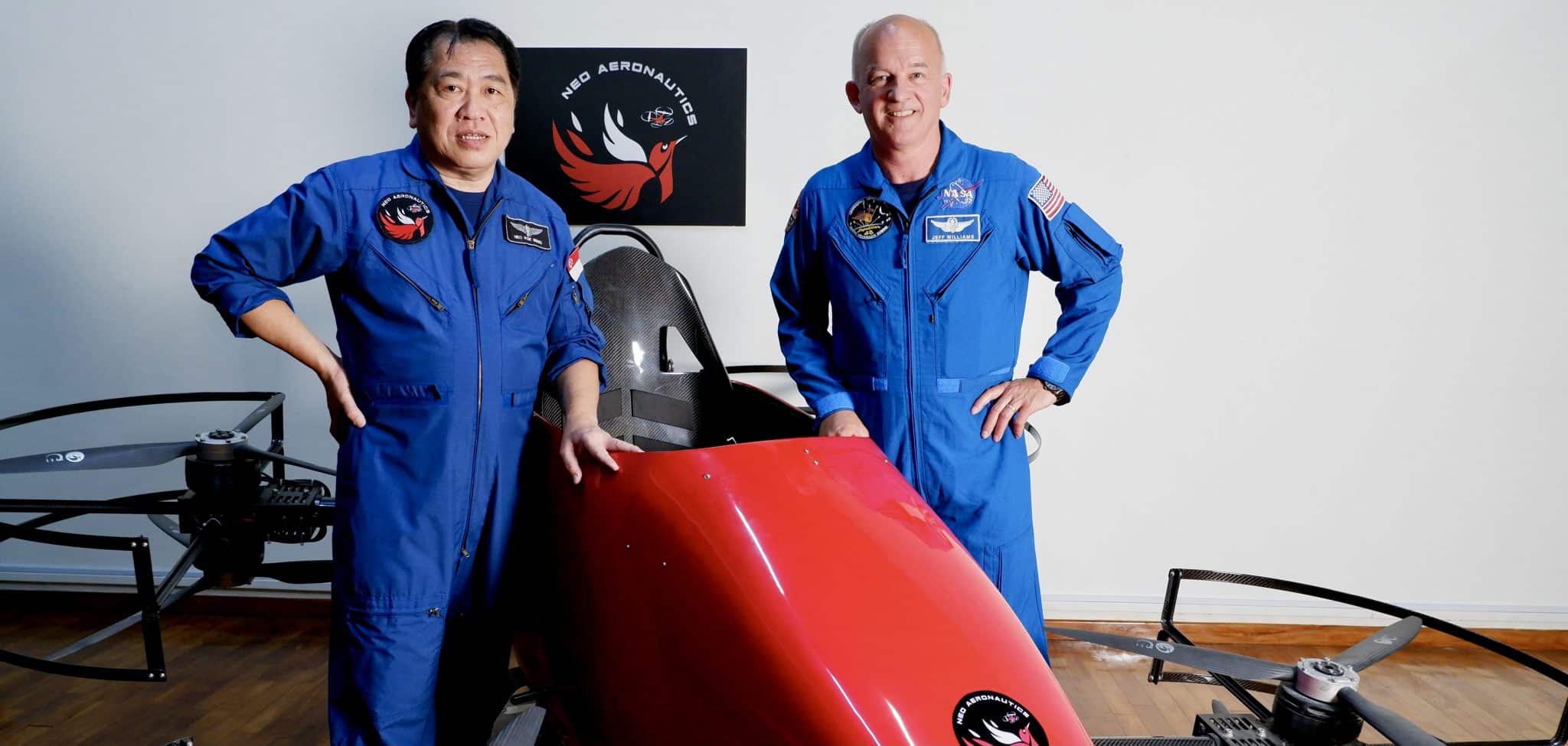“There is no conflict between science and faith,” say Singapore tech entrepreneur and US astronaut
Toh Han Shih // November 28, 2022, 4:52 pm

God gave man the unique ability to observe, contemplate and utilise God’s creation, said US astronaut Jeffrey Williams, who has conducted five space walks and commanded the ISS (International Space Station) twice. Photo courtesy of Neo Kok Beng and Jeffrey Williams.
US astronaut, Jeffrey Williams, spent 534 days in four space flights.
He concluded: It is possible for a Christian grounded in faith to explore the furthest frontiers of scientific knowledge.
Williams will be in Singapore next Wednesday, May 22, to speak with Singaporean technopreneur Dr Neo Kok Beng at Bethesda (Bedok-Tampines) Church.
In an interview with Salt&Light in 2022, Williams and Dr Neo said that science and faith work together in harmony.
“It is a lie to say that science and the Bible are in conflict,” Williams said. “They are perfectly compatible. The conflict, as popularly assumed, is not with science but with one’s philosophical presuppositions going into your science.”
“The universe is ordered in a very rational way … Life takes that ordering to an even higher level.”
Basically, the presupposition falls into two categories: Either there is a God who created all things, or there is no God so the existence of all things must be explained without an external first cause, Williams explained.
“The first category is rational and reasonable. The second is not.”
He added: “To say that everything exists as we know it by chance over time is illogical and irrational.
“The universe is ordered in a very rational way, as illustrated in mathematical ordering, physics, chemistry, optics, electromagnetics.
“Life takes that ordering to an even higher level. Creation is full of information communicated in that order. Information implies intelligence. Intelligence must have a source or a cause. That cause is the Creator God,” Williams argued.
He is currently working with Singaporean technopreneur, Dr Neo Kok Beng, in creating a Science and Faith programme for youth which will include online sessions and onsite activities.
Neo also recently worked with Williams in developing an Urban Aerial Mobility (UAM) vehicle, known in laymen’s language as a flying car.
“As an engineer, we are trained to apply science systematically and logically through evidence-based approach,” Neo said.
Convinced by the Bible
Born in Singapore, Neo was brought up to follow the traditional Chinese religion of his family. He became a Christian through his wife, Doris, who studied at Christian mission school, Fairfield Methodist Girls’ School.
Doris accepted Christ in 2012, and from that year onwards, he joined his wife for worship at Bedok Methodist Church.
“As I studied deeper into the Bible and other literature, known as apologetics, I was convinced and grew in my Christian faith.”
“Through the years, I started to read the Bible and joined a disciple group. Accepting Christ was through a period of study and reasonings. I finally developed the faith to become a Christian in 2017,” Neo recounted.
“As I studied deeper into the Bible and other literature, known as apologetics, I was convinced and grew in my Christian faith. I met Professor John Lennox, Emeritus Professor of Mathematics at Christ Church College, Oxford, and he has further built up my faith. Jeff Williams also introduced me to his good friend, Professor James Tour of Rice University, who is a synthetic organic chemist and I learned that there are no conflicts between science and faith.”
Lennox is a Christian apologist who has written books on the relationship between science and faith. He has taken part in public debates where he defended Christianity against atheists like Richard Dawkins, a British biologist well known for his criticism of creationism and the notion of intelligent design by a divine creator.
Tour was born into a Jewish family in the US and converted to Christianity. In 2001, his name was among the hundreds of scientists and engineers in a petition which expressed scepticism towards “claims for the ability of random mutation and natural selection to account for the complexity of life.”
Better place to live
Neo explained his interest in engineering as well: “I believe in creating value for society and contributing to making the world a better place to live. Scientific discoveries and technological innovations allow me to apply my scientific knowledge and industry expertise to work with the scientists and inventors to accomplish that.”
“I believe in creating value for society and contributing to making the world a better place to live.”
He graduated with a Bachelor’s degree in electronic and electrical engineering from the National University of Singapore (NUS) in 1991 and an MBA from Nanyang Technological University (NTU) in 1995. He obtained a doctorate of innovation from Singapore Management University (SMU) in 2021.
Over the years, he has worked on wearable artificial kidneys for dialysis patients and breath-analysers for detecting lung cancer and tackling infectious diseases like COVID-19.
He also worked for Singapore Technologies, a government-linked conglomerate, from 1991 to 2002, where he rose from system engineer to vice president.
Subsequently, he started his own ventures in medical technology and engineering.
An astronaut who believes in heaven
In the US, Williams graduated with a Bachelor of Science degree in Applied Sciences and Engineering from the United States Military Academy in 1980 and a Master’s degree in aeronautical engineering from the Naval Postgraduate School in 1987.
Williams spent a total of 534 days in space, with 56 people from about 12 countries.
He obtained a Master’s degree in national security and strategic studies from the Naval War College in 1996.
Complementing his technical studies, Williams became a Doctor of Ministry at the Master’s Seminary in the US in 2021.
“After high school, I entered the Military Academy at West Point with the interest in serving my country. I quickly became interested in becoming a helicopter pilot and narrowed my academic focus to aeronautical engineering,” Williams recounted.
His interest expanded to space flight, Williams said. “By 1979, I had a personal goal to pursue: Becoming an astronaut.”
“In time, doors of opportunity were opened. The army sent me to flight school in 1980, graduate school in 1985, a NASA assignment in 1987, test pilot school in 1992 followed by experimental test flight in 1993.
“The experience of science, engineering and operations in space has intensified my understanding of the Creator’s work.”
“Then after more than 10 years with six applications and three interviews, NASA selected me as an astronaut in 1996,” Williams recalled.
Williams’ career as an astronaut was focused on the International Space Station (ISS), starting from the development phase to bringing the space station to full operation. Williams has been on four space flights, all dedicated to the assembly of the ISS.
The first flight was a 10-day flight in 2000. The next three space flights lasted about six months each, all launched on a Russian Soyuz spacecraft from Kazakhstan.
The three flights occurred in 2006, 2009 till 2010, and 2016. Williams spent a total of 534 days in space, with 56 people from about 12 countries. He has conducted five space walks and commanded the ISS (International Space Station) twice.
“The experience has only strengthened my faith. The experience of science, engineering and operations in space has illustrated and intensified an understanding of the Creator’s work and purpose described in His Word,” Williams said.
Following his return from the Expedition 21 mission, he wrote the book The Work of His Hands: A View Of God’s Creation From Space about his experience in space.
Contemplating God’s creation
The so-called “Age of Science” or “Scientific Revolution”, led by scientists such as Johannes Kepler and Robert Boyle came about as a result of the Reformation and return to the Scriptures, Williams pointed out.
“Their confidence was in Scripture regarding God’s purpose in creation. Order was assumed and was to be discovered.”
“Those scientists were theologians first and were driven by their convictions that scientific endeavour was an act of obedience to the commands of Scripture. Their confidence was in Scripture regarding God’s purpose in creation. Order was assumed and was to be discovered.”
Boyle, a British scientist who lived from 1627 to 1691, and Kepler, a German mathematician cum astronomer who lived from 1571 to 1630, were devout Protestants.
Boyle made important contributions to science like Boyle’s law which described the relation between the volume and pressure of a gas, but he was also known for his writings on theology.
God gave man the unique ability to observe, consider, contemplate, find, extract, develop and utilise God’s creation, said Williams.
Dr Jeffrey Williams will be in Singapore to speak at the Science & Faith Seminar next Wednesday, May 22, 10am at Bethesda (Bedok-Tampines) Church. The former NASA astronaut will be speaking with Singapore’s Dr Neo Kok Beng (Fellow of the Royal Aeronautical Society) about God’s creation, life and faith. Registration is free. Sign up here.
RELATED STORIES:
We are an independent, non-profit organisation that relies on the generosity of our readers, such as yourself, to continue serving the kingdom. Every dollar donated goes directly back into our editorial coverage.
Would you consider partnering with us in our kingdom work by supporting us financially, either as a one-off donation, or a recurring pledge?
Support Salt&Light



